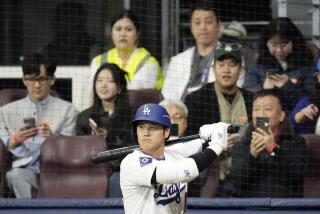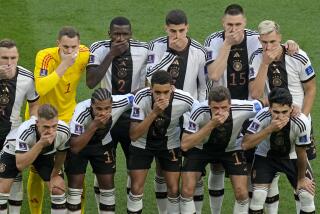WORLD CUP SOCCER ’94 / THE FIRST ROUND : ANALYSIS : After Second-Half Rally, Koreans Take Home Pride
DALLAS — What World Cup ’94 had been missing until now, it finally found in the furnace-like heat of Texas--an exceptional game that will be talked about for years to come.
The final statistics will show that Germany defeated South Korea before a sellout crowd of 63,998 at the Cotton Bowl, 3-2. But they will not show the drama and the passion, the energy and the emotion that made this the finest game of the tournament.
For the first 45 minutes, the Germans, led by striker Juergen Klinsmann, the baker’s son from Stuttgart, gave as comprehensive a display of attacking soccer as has been seen in this World Cup.
For the second 45 minutes, South Korea, led by the inspirational play of defender Hong Myung-bo, produced the bravest comeback since, well, since it had done the same thing against Spain on opening day.
There seemed to be no stopping Germany in the first half. Coach Berti Vogts tried yet another new combination, but the inclusion of giant defender-turned-midfielder Guido Buchwald was the key change.
Buchwald, a member of the 1990 World Cup-winning team, is an inspirational player, his presence alone lifting his teammates’ game and spirits.
In the 12th minute, Klinsmann scored a superb goal, turning and hitting the ball on the volley after receiving a pin-point pass from Thomas Haessler. South Korean goalkeeper Choi In-young had no chance.
Eight minutes later, Klinsmann was again involved as the Germans went two goals ahead. His throw-in found Buchwald, who was tackled and brought to the ground but managed to swing a leg at the ball, connect with it perfectly and send it spinning against the left post beyond the goalkeeper’s dive.
The rebound was slammed into the net by the onrushing Karlheinz Riedle and Germany was on its way. The South Koreans appeared headed for a heavy defeat.
That impression did not fade, even as the half wore on and the Asian team gradually began to mount some promising attacks. The German right flank appeared particularly vulnerable and Shin Hong-gi and Kim Joo-sung, both blessed with excellent ball skills, began to exploit German right back Stefan Effenberg’s lack of speed.
The Koreans had found the weak point in the German defense--Vogts played Thomas Strunz in the right back position against Spain with no better success--and Germany’s future opponents will have taken note of the weakness.
They will also have noticed that in this game, Lothar Matthaeus played an attacking role, often moving up into the midfield and even into the forward line. When he did so, Juergen Kohler dropped back to play sweeper and did so quite well.
In the 37th minute, Klinsmann again received a free kick from Haessler, held off a defender who was all over his back and hit a right-footed shot that slipped beneath the diving goalkeeper.
At 3-0, the game appeared over. Surely Germany would send on its substitutes in the second half, conserve energy and simply run out the clock.
That might have been Vogts’ intent, but it was not the way it worked out. Kim Ho, the South Korean coach, had other ideas, no doubt having reminded his team about such things as duty and honor and pride, not to mention South Korea’s hopes of staging the World Cup in 2002.
He also made two critical substitutions. Choi, the luckless goalkeeper, was benched, possibly for a long time. Kim also brought his right wing Seo Jung-won, he of the blazing speed and blistering shot, on in place of Cho Jim-so.
Finally, Kim handed the captain’s armband to Hong, having taken it from Choi.
The lecture and the accompanying moves worked. A chip shot from the tireless Hwang Sun-nong made the score 3-1 in the 52nd minute, to the delight of the crowd.
Hong was next to pierce the Germans’ armor, firing a tremendous shot past goalkeeper Bodo Illgner from about 25 yards in the 63rd minute. This got the Korean drums in the stands beating a lot louder and the Korean flags waving much more enthusiastically.
Vogts substituted Andreas Moeller for Matthaeus and cast anxious glances at Effenberg, who was being exposed time and again on the right wing.
The Koreans kept coming, pinning the Germans in their own half and trying everything to score the third goal that would send them home unbeaten.
They never got it, but the team’s brave performance scored a victory of another kind. A victory for the sport.






